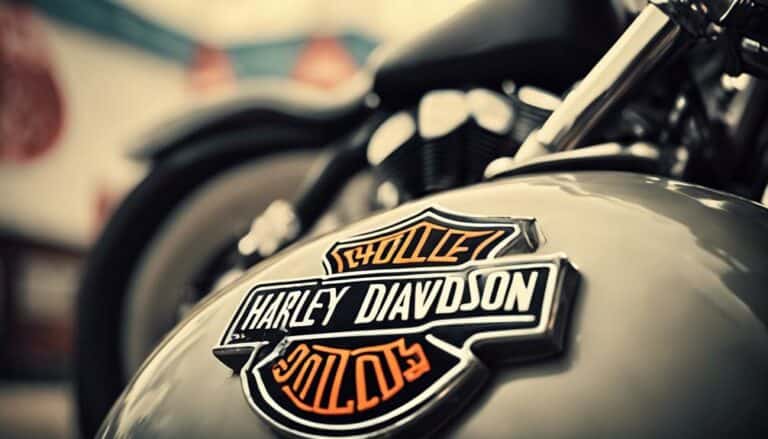If you've ever wondered about the optimal fuel choice for your Harley Davidson, it's essential to consider the impact of using the right type of gasoline on your motorcycle's performance.
But have you ever thought about how ethanol content in gasoline could affect your Harley's engine? Understanding the intricacies of fuel selection can make a significant difference in how your bike runs and its longevity.
Let's explore the nuances of what kind of gas is best suited for your beloved Harley and the implications of making the right choice.
Key Takeaways
- Use high octane fuel for optimal performance and engine longevity.
- Avoid ethanol in gasoline to prevent corrosion and engine damage.
- Select the right gas based on engine compression ratio for best results.
- Consult with experts to address any gas-related issues like engine knocking.
Types of Fuel Recommended for Harley-Davidson
When fueling your Harley-Davidson motorcycle, it's crucial to use the recommended premium unleaded gasoline to ensure optimal performance and engine longevity. Harley-Davidson motorcycles, especially those equipped with high compression engines, greatly benefit from high octane fuel.
High compression engines require higher octane levels to prevent knocking and maintain efficiency during combustion. For engines with a compression ratio of 10:1 or higher, using high octane fuel is essential for achieving peak performance and ensuring proper combustion processes.
While the 103ci Twin Cam Harley with a compression ratio under 10:1 can run on 87 octane fuel without issues, the 1200cc Evolution and 1247cc Revolution engines are designed to operate most efficiently with high octane fuel.
Understanding Octane Ratings for Harley
Understanding the octane ratings for your Harley-Davidson motorcycle is crucial for optimizing performance and engine efficiency. When it comes to your Harley's engine, here are some key points to consider:
- High Octane Fuel: Harley-Davidson recommends using high octane gasoline for fuel-injected models to ensure optimal performance.
- Engine Compression: High compression engines, such as those in Harley bikes, benefit significantly from high octane fuel to prevent knocking and maintain efficiency.
- Spark Plug Performance: Using the correct octane level supports timing advance and enhances engine responsiveness, crucial for a smooth ride.
Impact of Ethanol in Harley Gasoline
Ethanol content in gasoline can significantly impact the performance and longevity of Harley-Davidson motorcycles by attracting moisture and causing corrosion in the fuel system. This attraction to moisture can lead to detrimental effects on the fuel system, potentially degrading rubber components over time.
It's crucial to note that higher ethanol blends, such as E85, aren't suitable for use in Harley-Davidson bikes due to the risks of damage and decreased fuel efficiency. Additionally, the presence of ethanol in gasoline can result in phase separation within the fuel, creating a harmful mixture that can damage engine components.
To maintain optimal engine performance and reliability, especially in older Harley models, opting for ethanol-free gasoline is highly recommended. By avoiding ethanol in your gasoline choice, you can help safeguard your Harley-Davidson motorcycle's engine and fuel system from potential harm, ensuring a smoother and more reliable riding experience.
Tips for Choosing the Right Gas
To ensure optimal performance and longevity for your Harley-Davidson motorcycle, selecting the right type of gasoline is crucial, particularly focusing on the recommended octane levels for different engine types. When choosing the right gas for your Harley, keep the following tips in mind:
- Premium Unleaded: Harley-Davidson recommends using premium unleaded gasoline for all fuel-injected models to ensure high performance and efficiency.
- Compression Ratio: Engines with a compression ratio of 10:1 or higher benefit from high octane gasoline to prevent knocking and maintain optimal performance.
- Spark Plugs: Using the correct octane level not only benefits the engine but also ensures the spark plugs remain in good condition, contributing to overall engine health and longevity.
Common Gas-related Issues and Solutions
When encountering gas-related issues with your Harley-Davidson motorcycle, addressing them promptly is essential to maintain optimal performance and prevent potential engine damage.
Using lower octane fuel than recommended can result in engine knocking, especially in high compression engines. To avoid this, opt for premium unleaded gasoline as advised by Harley-Davidson for fuel-injected models to prevent problems like pinging.
While ethanol content in fuel may not drastically affect engine performance, some riders prefer ethanol-free gas for better results. If you notice engine knocking, it's crucial to adjust the octane level of your fuel to match the requirements of your bike's engine.
Additionally, seeking advice from experienced riders on fora platforms or forums can provide valuable insights and links to resources that offer solutions to common gas-related issues.
Conclusion
In conclusion, selecting the appropriate fuel for your Harley Davidson is crucial for maintaining peak performance and engine health.
By understanding the recommended octane levels, the impact of ethanol, and common gas-related issues, you can ensure your ride runs smoothly and efficiently.
Remember to choose premium unleaded gasoline to keep your Harley in top condition and enjoy the open road with confidence.

